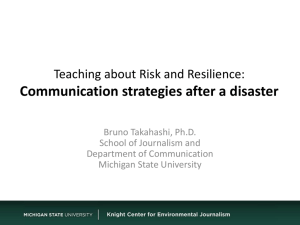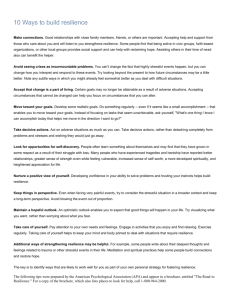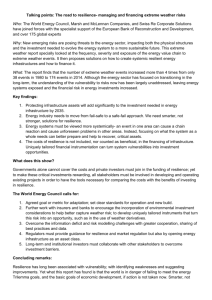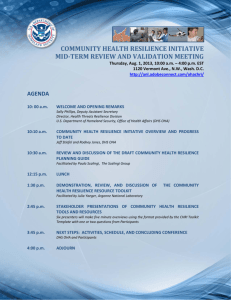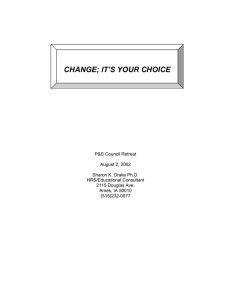C
advertisement
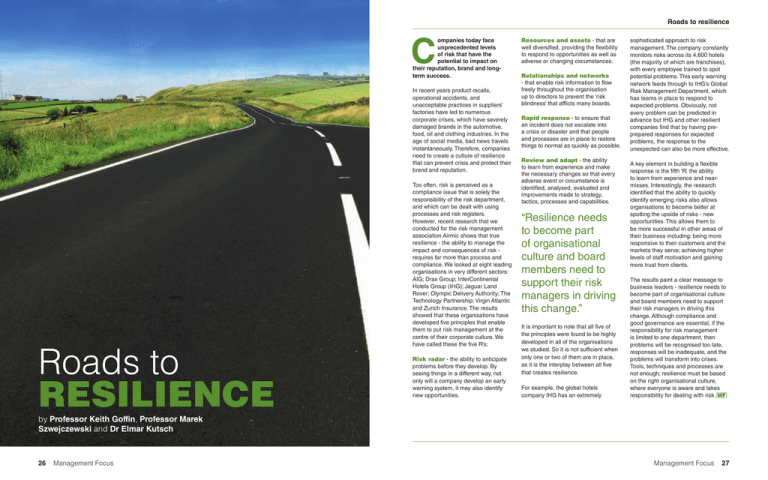
Roads to resilience C ompanies today face unprecedented levels of risk that have the potential to impact on their reputation, brand and longterm success. In recent years product recalls, operational accidents, and unacceptable practices in suppliers’ factories have led to numerous corporate crises, which have severely damaged brands in the automotive, food, oil and clothing industries. In the age of social media, bad news travels instantaneously. Therefore, companies need to create a culture of resilience that can prevent crisis and protect their brand and reputation. Roads to RESILIENCE Too often, risk is perceived as a compliance issue that is solely the responsibility of the risk department, and which can be dealt with using processes and risk registers. However, recent research that we conducted for the risk management association Airmic shows that true resilience - the ability to manage the impact and consequences of risk requires far more than process and compliance. We looked at eight leading organisations in very different sectors: AIG; Drax Group; InterContinental Hotels Group (IHG); Jaguar Land Rover; Olympic Delivery Authority; The Technology Partnership; Virgin Atlantic and Zurich Insurance. The results showed that these organisations have developed five principles that enable them to put risk management at the centre of their corporate culture. We have called these the five R’s: Risk radar - the ability to anticipate problems before they develop. By seeing things in a different way, not only will a company develop an early warning system, it may also identify new opportunities. Resources and assets - that are well diversified, providing the flexibility to respond to opportunities as well as adverse or changing circumstances. Relationships and networks - that enable risk information to flow freely throughout the organisation up to directors to prevent the ‘risk blindness’ that afflicts many boards. Rapid response - to ensure that an incident does not escalate into a crisis or disaster and that people and processes are in place to restore things to normal as quickly as possible. Review and adapt - the ability to learn from experience and make the necessary changes so that every adverse event or circumstance is identified, analysed, evaluated and improvements made to strategy, tactics, processes and capabilities. “Resilience needs to become part of organisational culture and board members need to support their risk managers in driving this change.” It is important to note that all five of the principles were found to be highly developed in all of the organisations we studied. So it is not sufficient when only one or two of them are in place, as it is the interplay between all five that creates resilience. For example, the global hotels company IHG has an extremely sophisticated approach to risk management. The company constantly monitors risks across its 4,600 hotels (the majority of which are franchises), with every employee trained to spot potential problems. This early warning network feeds through to IHG’s Global Risk Management Department, which has teams in place to respond to expected problems. Obviously, not every problem can be predicted in advance but IHG and other resilient companies find that by having preprepared responses for expected problems, the response to the unexpected can also be more effective. A key element in building a flexible response is the fifth ‘R’, the ability to learn from experience and nearmisses. Interestingly, the research identified that the ability to quickly identify emerging risks also allows organisations to become better at spotting the upside of risks - new opportunities. This allows them to be more successful in other areas of their business including: being more responsive to their customers and the markets they serve; achieving higher levels of staff motivation and gaining more trust from clients. The results paint a clear message to business leaders - resilience needs to become part of organisational culture and board members need to support their risk managers in driving this change. Although compliance and good governance are essential, if the responsibility for risk management is limited to one department, then problems will be recognised too late, responses will be inadequate, and the problems will transform into crises. Tools, techniques and processes are not enough; resilience must be based on the right organisational culture, where everyone is aware and takes responsibility for dealing with risk. MF by Professor Keith Goffin, Professor Marek Szwejczewski and Dr Elmar Kutsch 26 Management Focus Management Focus 27



